Juro Alternatives
Find 10 alternatives to Juro. This guide offers a detailed comparison of features and pricing to help you select a new platform.

You might be using Juro for good reasons. It’s known for being easy to use and efficient, which helps save time. Many teams find it intuitive for creating and managing contracts, making it a solid choice for specific workflows.
However, some users find it has limitations, like missing features or limited customization. This is why you might look for an alternative. We've analyzed the best options based on G2 reviews to help you compare them against Juro. Let's get started.
Consider 11x for Your Sales Team
If you want to add digital workers to your sales force, 11x is a relevant option. It provides autonomous agents to handle specific sales tasks. This can allow your team to focus on other priorities.
The platform is for sales teams that want to delegate parts of their workflow. You can evaluate how these digital workers might integrate with your operations and address specific requirements.
11x is a GTM platform that uses AI agents for sales tasks. An agent named Alice finds prospects, handles outreach on email and LinkedIn, and maintains your CRM. Another agent, Julian, qualifies inbound leads and schedules meetings.
The platform combines data enrichment, outreach, and email warmup functions. This approach can replace several separate tools in a standard GTM stack, unifying them into one system.
Juro Alternatives
This section reviews several Juro alternatives. We analyze each option's pricing, features, and its main advantages and drawbacks compared to Juro.
1) Ironclad
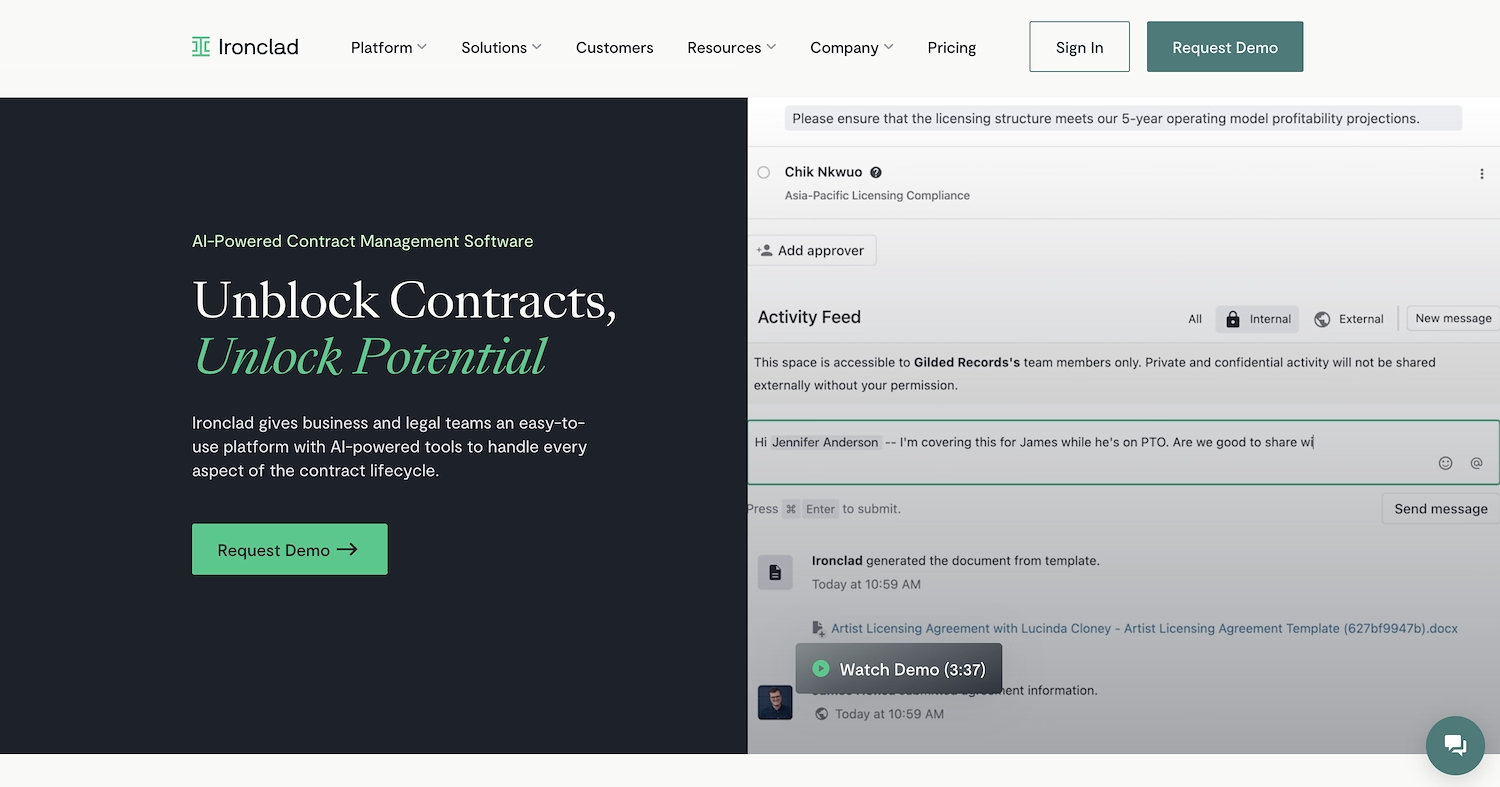
Ironclad is a Contract Lifecycle Management platform with AI functions. It helps business and legal teams handle contracts from creation to analysis. The system includes an AI assistant, Ironclad Jurist, and an e-signature tool, Ironclad Signature.
The platform can draft NDAs and MSAs, accelerate sales contracts, and manage vendor agreements. It also centralizes contracts into a searchable repository for visibility and analytics.
Ironclad's Main Features
- Offers a multi-agent AI assistant, Ironclad Jurist, for drafting, redlining, and contract research.
- Includes a workflow designer for self-service contract creation with conditional approvals and compliance controls.
- Provides pre-built connectors to integrate with Salesforce, Coupa, Slack, and other business systems.
- Features a context-aware e-signature and clickwrap tool, Ironclad Signature, for use on any device.
How Ironclad Compares to Juro
Average Review Score: 4.5/5 stars based on 240 G2 reviews.
- Ironclad includes an AI assistant, Ironclad Jurist, which provides more specialized support for drafting and research compared to Juro’s general AI functions.
- Its workflow designer uses conditional approvals to offer more granular compliance control during contract creation than Juro's standard workflow system.
- With pre-built connectors for systems like Coupa and Salesforce, the platform integrates more deeply into enterprise workflows than Juro.
- It features a context-aware e-signature tool that adapts to any device for a more flexible signing experience compared to Juro's native signature function.
Where Ironclad Falls Short Compared to Juro
- Ironclad sometimes has a steep learning curve, which can make its initial setup longer compared to Juro's more intuitive interface.
- Some users report that its search function can be difficult for finding specific contract details, unlike Juro's more direct search experience.
- The tool's integrations can sometimes present issues during setup. This might require more technical support than Juro's generally simpler integrations.
- Its contract repository is sometimes considered less robust than Juro's, which can affect the overall document management experience for some teams.
Pricing and Cost-Effectiveness
Based on user reviews, Ironclad has a lower perceived cost than Juro. However, Juro offers a faster return on investment at 11 months versus Ironclad's 15, and a quicker implementation time of two months compared to four.
2) Concord
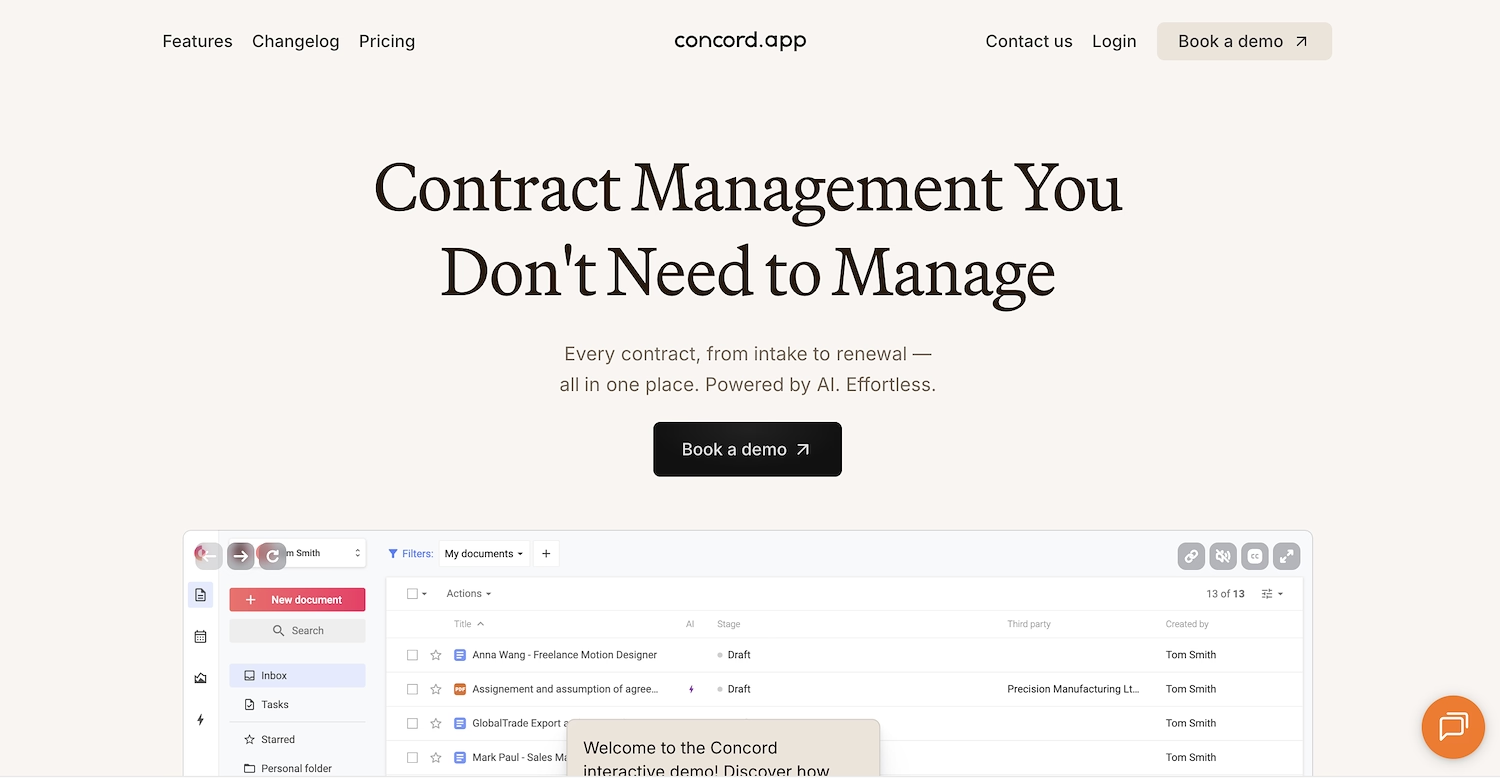
Concord is a contract lifecycle platform with AI functions. It brings every contract phase—from intake and draft creation to negotiation, signature, and storage—into one workspace. The system lets business teams handle 70% of contracts without legal.
This approach frees attorneys for high-value work. Self-serve intake and smart routes direct contracts, while an AI Copilot answers routine questions. The platform supports any contract type.
Concord's Main Features
- Uses AI to monitor deadlines and automatically builds executive-ready reports.
- Allows business users to create compliant contracts from legal-approved templates through a self-serve intake process.
- Includes built-in redlining, version control, commenting, and e-signature to reduce email exchanges.
- Imports legacy agreements in bulk and uses AI to automatically extract metadata like key dates and payment terms.
How Concord Compares to Juro
Average Review Score: 4.3/5 stars based on 132 G2 reviews.
- Concord uses AI to monitor deadlines and build reports, which offers more specific post-signature analytics compared to Juro's general AI assistance.
- Its self-serve intake allows business teams to create compliant contracts from templates, which reduces legal involvement more than Juro's standard creation process.
- The tool centralizes redlining, version control, and commenting in one workspace. This can reduce reliance on email exchanges more than Juro's collaboration features.
- It can bulk import legacy contracts and uses AI to extract key metadata, a feature for data migration that is more advanced than Juro's standard document repository functions.
Where Concord Falls Short Compared to Juro
- Some users report that Concord can have software bugs that may disrupt workflows. In comparison, Juro is often noted for a more stable and intuitive platform experience.
- The platform's customer support is sometimes described as less responsive. This can be a drawback for teams that need immediate help, whereas Juro's support is generally considered more available.
- Its interface can feel less polished due to occasional technical issues. Juro, by contrast, is frequently praised for a more streamlined design that simplifies user interactions.
Pricing and Cost-Effectiveness
Concord provides transparent pricing starting at $49 per user per month, making budgeting straightforward. Juro uses a quote-based model, which lacks this upfront clarity but may allow for more customized enterprise packages. For specific tier details, you can visit Concord's official website.
3) PandaDoc

PandaDoc is a cloud-based platform for agreement management. It handles the workflow from document creation to signature and payment. Teams use it to create, send, track, and eSign business documents to finalize deals faster.
The system supports interactive sales proposals that track recipient engagement. It also provides digital deal rooms for collaboration and manages the contract lifecycle with tools for redlines, version control, and approvals, while it maintains compliance.
PandaDoc's Main Features
- Includes a Configure-Price-Quote (CPQ) tool that pulls data from a product catalog, applies pricing rules, and generates automated quotes.
- Embeds payment gateways such as Stripe, Square, and PayPal, which allows customers to pay directly from the document.
- Provides digital deal rooms that serve as collaboration spaces for real-time commenting, redlining, and approvals.
- Offers over 700 native and Zapier integrations with systems like Salesforce, HubSpot, and Google Workspace.
How PandaDoc Compares to Juro
Average Review Score: 4.7/5 stars based on 2,893 G2 reviews.
- PandaDoc provides a CPQ tool to generate automated quotes from a product catalog. This offers more specialized support for sales teams compared to Juro's general contract creation features.
- It embeds payment gateways directly within documents, which allows clients to pay immediately after signing. Juro's platform focuses on the contract lifecycle without a native payment collection feature.
- The tool offers digital deal rooms as dedicated spaces for collaboration and negotiation. This provides a more sales-focused environment than Juro's standard commenting and redlining functions.
- With over 700 integrations, PandaDoc connects with a wider range of business systems. This is a more extensive selection than Juro's curated list of integrations.
Where PandaDoc Falls Short Compared to Juro
- PandaDoc's customization options can be limited for complex legal agreements. Juro, in contrast, provides a more specialized environment built specifically for intricate contract workflows that legal teams often manage.
- Some users report occasional software bugs that may disrupt document workflows. In comparison, Juro is often noted for a more stable platform experience, a key factor for teams that handle high-volume contracts.
- The tool's primary focus is on sales documents. This means it sometimes lacks the advanced legal review and analysis tools that are central to Juro's contract lifecycle management system.
Pricing and Cost-Effectiveness
PandaDoc offers transparent pricing starting at $19 per user per month, providing cost predictability, while Juro uses a quote-based model that may suit custom enterprise needs. For full details, you can visit PandaDoc's official website.
4) DocuSign CLM
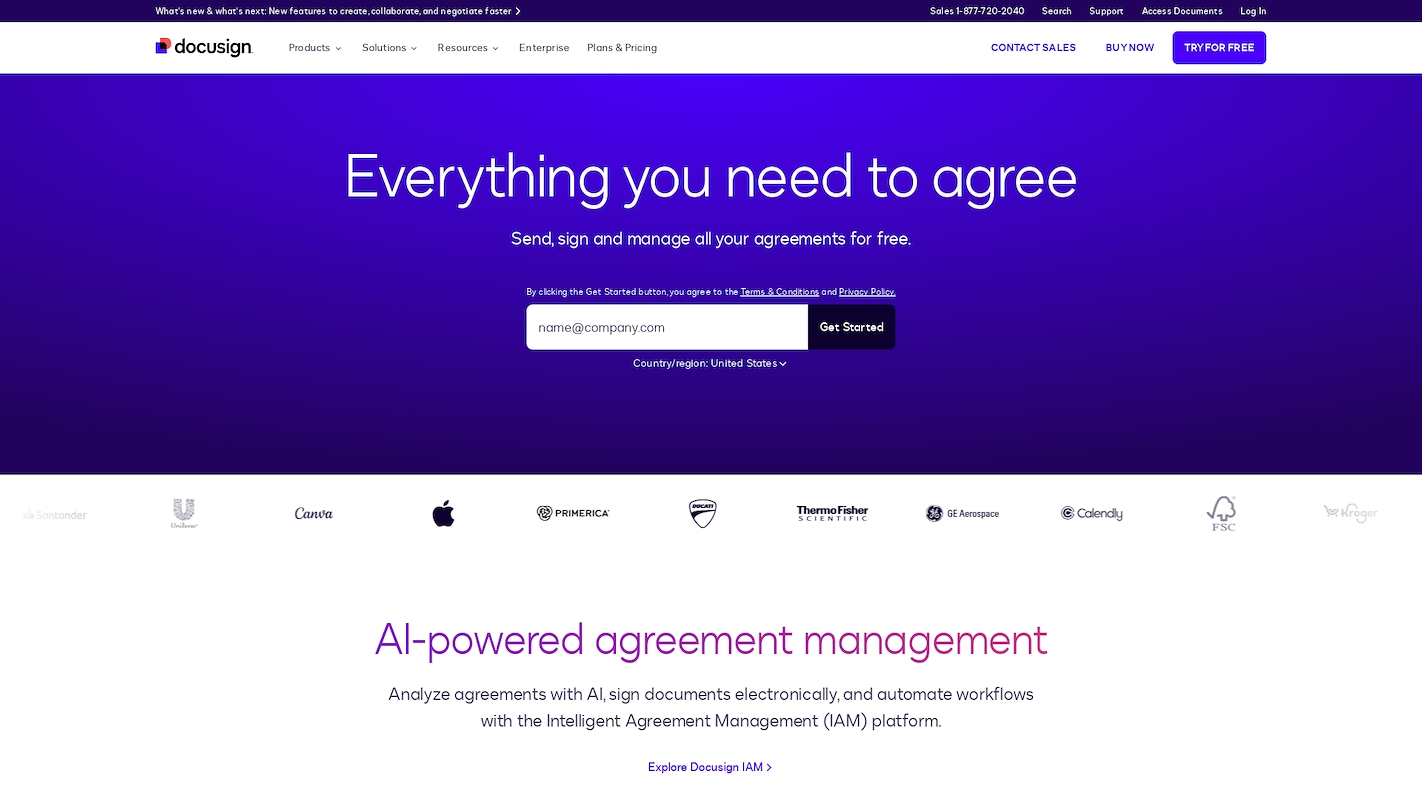
DocuSign CLM is a system to automate the entire agreement lifecycle. It connects the processes to prepare, sign, act on, and manage contracts. The platform offers tools for document generation and provides visibility on document status, which addresses proposal and document track requirements.
It also centralizes all contracts into a single, searchable repository. This helps with contract organization and analysis across the business.
DocuSign CLM's Main Features
- Offers a drag-and-drop workflow designer with over 100 pre-configured steps to automate processes from generation to storage.
- Uses more than 100 pre-trained AI models to extract and analyze clauses, score risk, and identify trends from contract data.
- Generates documents with one click from templates and a pre-approved clause library, with conditional rules to flag non-standard terms.
- Provides a centralized repository with keyword, concept, and metadata search, along with obligation and renewal tracking.
How DocuSign CLM Compares to Juro
Average Review Score: 4.3/5 stars based on 407 G2 reviews.
- DocuSign CLM provides a drag-and-drop workflow designer with over 100 pre-configured steps. This offers more detailed process automation compared to Juro's standard workflow system.
- It uses more than 100 pre-trained AI models to analyze clauses and score risk. This provides more in-depth contract analytics than Juro’s general AI assistance.
- The platform generates documents from a pre-approved clause library with conditional rules. This gives more control over non-standard terms than Juro's template-based creation.
- Its centralized repository includes concept and metadata search. This allows for more advanced contract discovery compared to Juro's standard keyword search function.
Where DocuSign CLM Falls Short Compared to Juro
- DocuSign CLM sometimes presents a steep learning curve for new users. Its interface can feel less intuitive than Juro's, which might make the initial setup and training process longer for some teams.
- Its implementation process is sometimes more complex and takes longer. The platform requires an average of three months to set up, compared to Juro's two months, which can affect how quickly a team sees a return on investment.
- Some users report that its workflows can feel cumbersome for certain tasks. In contrast, Juro is often described with a more intuitive and stable platform experience that simplifies daily contract management activities.
Pricing and Cost-Effectiveness
While we've covered key features and use cases in this comparison, pricing models can vary significantly between tools. For the most accurate and up-to-date pricing information, we recommend visiting DocuSign CLM's official website.
5) Agiloft Contract Lifecycle Management

Agiloft Contract Lifecycle Management is a no-code platform for contract data that helps businesses automate the entire contract process. The system provides a central repository to store and manage agreements.
For teams focused on proposals, it offers tools to assemble documents and follow their status through the lifecycle. This function gives visibility into contract obligations and renewals.
Agiloft Contract Lifecycle Management's Main Features
- Provides a no-code platform that automates the entire contract process.
- Includes a central repository to store and manage all business agreements.
- Offers tools to assemble documents and track their status throughout the contract lifecycle.
- Features tools that provide visibility into contract obligations and renewal dates.
How Agiloft Compares to Juro
Average Review Score: 4.6/5 stars based on 89 G2 reviews.
- Agiloft has a no-code platform that allows for deep workflow customization, a more flexible approach than Juro's standard setup.
- Its Data-first Agreement Platform treats contracts as structured data. This allows for deeper business insights than what is possible with Juro's document-centric repository.
- The tool has a 99.6% implementation success rate. This suggests a reliable setup for complex systems, unlike Juro's focus on a faster implementation time.
- It uses AI to connect contract data with business outcomes. This gives it a different analytical focus from Juro's general AI assistance.
Where Agiloft Falls Short Compared to Juro
- Some users report that Agiloft has a steep learning curve. In comparison, Juro's interface is often described as more intuitive, which can simplify the initial training for a team.
- The platform's implementation takes an average of six months. This is a longer setup period than Juro's typical two-month timeline, which might delay the return on investment.
- While the tool offers deep customization, some reports indicate that configuring the system can be difficult without technical help. Juro, in contrast, provides a more straightforward setup.
Pricing and Cost-Effectiveness
Juro offers a faster return on investment at 11 months compared to Agiloft's 16 months, and a quicker implementation time of two months versus six. Both platforms use quote-based pricing. For specific details, we recommend visiting Agiloft's official website.
Explore 11x for Sales Automation
If you want to add digital workers to your sales force, consider 11x. The platform provides autonomous agents to manage prospect discovery, outreach, and CRM maintenance. This approach lets your sales team focus on higher-priority objectives and strategic growth.
With 11x, we run your sales playbook. Our agent Alice finds accounts and handles outreach, while Julian qualifies leads and schedules meetings. The platform unifies intent data and email warmup, replacing multiple tools in a standard GTM stack.
Book a demo to see the platform in action.
6) ContractWorks
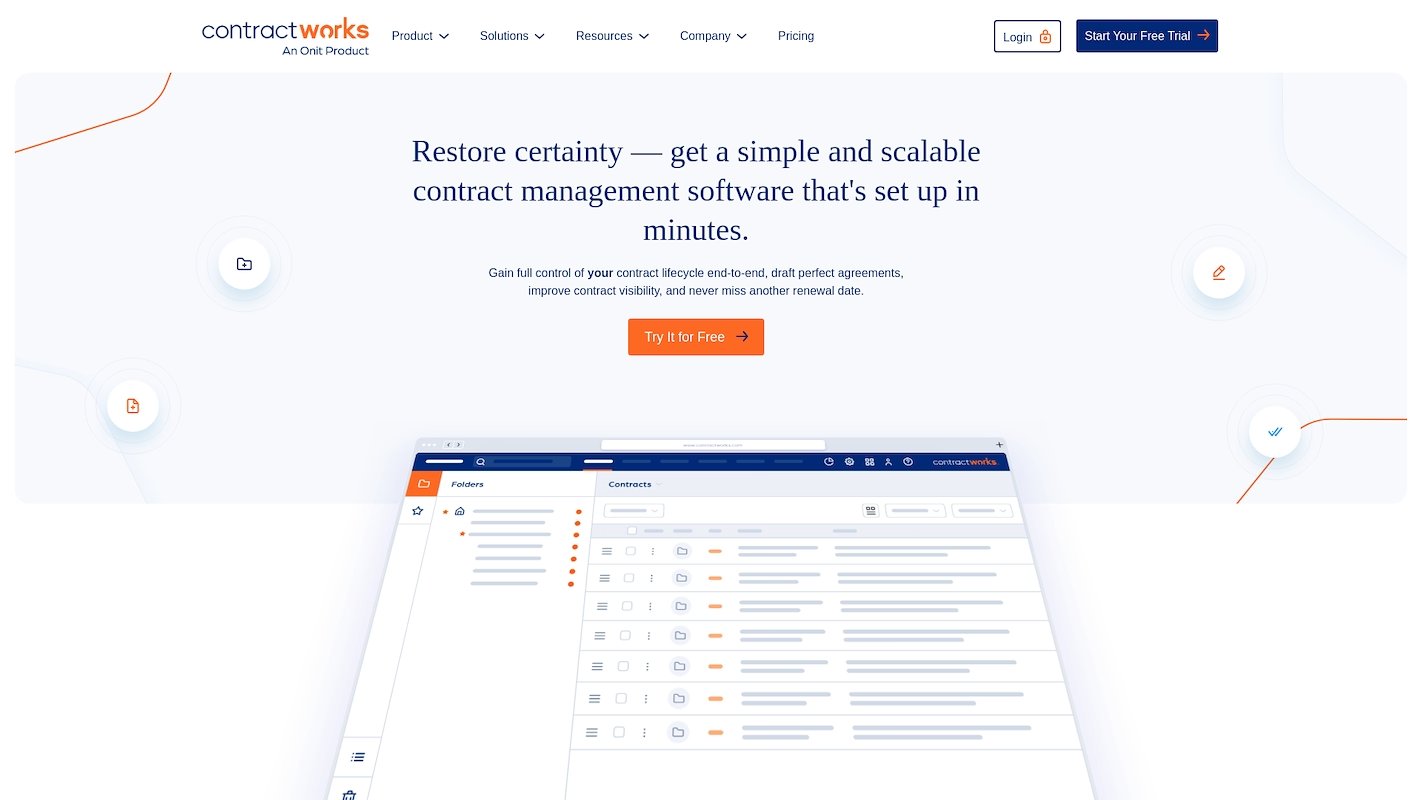
ContractWorks is contract management software for secure document storage and organization. The system provides a central, searchable repository to keep all agreements in one place.
For document tracking, it offers automated alerts for key dates and milestones. The platform also includes electronic signature capabilities and provides audit trail reports for visibility into the contract lifecycle.
ContractWorks's Main Features
- Offers unlimited users on every pricing plan, a feature that supports scalability.
- Uses GPT-3 to generate new clauses and simplify legal language.
- Includes a smart drafting tool that creates contracts from a questionnaire in less than 10 minutes.
- Provides a centralized, SOC 2 compliant repository with permission-based user roles.
How ContractWorks Compares to Juro
Average Review Score: 4.8/5 stars based on 81 G2 reviews.
- ContractWorks includes unlimited users on all its pricing plans, which offers more predictable costs for scaling teams compared to Juro's typical per-seat model.
- It uses GPT-3 to generate new clauses and simplify legal language, offering a specific drafting assistant that differs from Juro’s broader AI features.
- The smart drafting tool creates contracts from a questionnaire, which provides a more guided creation path than Juro's standard template-based workflow.
- The platform provides folder-level permissions, allowing for more specific access control within the repository than Juro's general permission settings.
Where ContractWorks Falls Short Compared to Juro
- Some users report that the platform's reporting functions are limited. This is different from Juro, which offers more integrated analytics across the entire contract lifecycle.
- ContractWorks centers on secure storage and tracking. This means its in-document editing tools may not support complex, real-time negotiations as fluidly as Juro's native editor does.
- The tool's workflow automation is strong for post-signature management. However, it might feel less complete for pre-signature stages when compared to Juro's end-to-end system.
- While generally easy to use, some reviews mention minor usability issues, such as with its two-factor authentication. Juro, by comparison, is frequently noted for a consistently smooth user experience.
Pricing and Cost-Effectiveness
ContractWorks offers transparent pricing that starts at $700 per month and includes unlimited users. This model provides cost predictability for scaling teams, which contrasts with Juro's quote-based system. For more details, you can visit the ContractWorks website.
7) LinkSquares
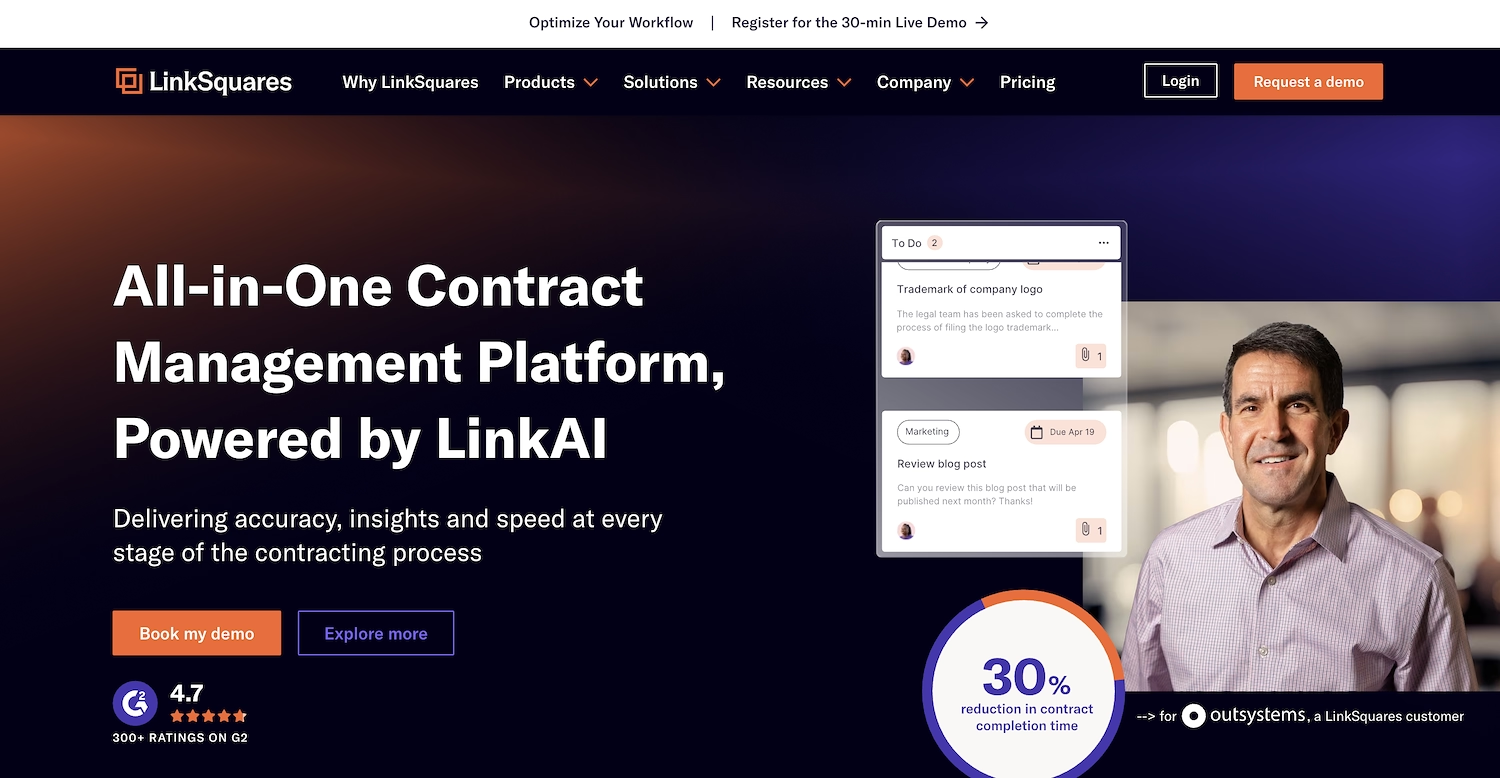
LinkSquares is a contract lifecycle management platform with AI functions for legal and business teams. The system organizes and analyzes agreements to give visibility across a contract portfolio.
It provides tools to track the status of proposals and manage documents through their lifecycle.
LinkSquares's Main Features
- Uses an agentic AI, LinkAI, for conversational search and to deliver proactive contract insights.
- Includes a risk scoring agent that automatically evaluates contract clauses against organization-specific risk profiles.
- Provides a legal project management tool to centralize task and project tracking for all legal work, not just contracts.
- Features a purpose-built, native AI with proprietary models trained specifically on legal content.
How LinkSquares Compares to Juro
Average Review Score: 4.7/5 stars based on 392 G2 reviews.
- LinkSquares uses an agentic AI, LinkAI, for conversational search, which delivers more proactive contract insights compared to Juro's general AI assistance.
- Its risk scoring agent automatically evaluates clauses against company-specific profiles, offering more tailored risk analysis than Juro's standard compliance checks.
- The platform includes a legal project management tool to track all legal work, not just contracts. This provides a broader view of legal operations than Juro's contract-centric system.
- It features a native AI trained specifically on legal content, which allows for more precise analysis compared to Juro's AI for general contract functions.
Where LinkSquares Falls Short Compared to Juro
- Some users find the customization options in LinkSquares to be limited for complex legal needs. In contrast, Juro provides a flexible native editor that allows for more detailed modifications to contracts.
- The platform's AI can sometimes have inaccuracies when it extracts contract data. This may require users to perform manual reviews, a step not always needed with Juro's AI assistance.
- Some users report that the interface feels rigid, which can make navigation less direct. Juro, by comparison, is often described as having a more intuitive and clean user experience that simplifies workflows.
- The implementation process for LinkSquares takes an average of three months. This is slightly longer than Juro's two-month setup period, which might affect the time it takes for a team to become fully operational.
Pricing and Cost-Effectiveness
Juro offers a faster return on investment at 11 months compared to LinkSquares's 15 months, and a quicker implementation time of two months versus three. Both platforms use a quote-based pricing model. For specific details, we recommend visiting the LinkSquares's official website.
8) Evisort
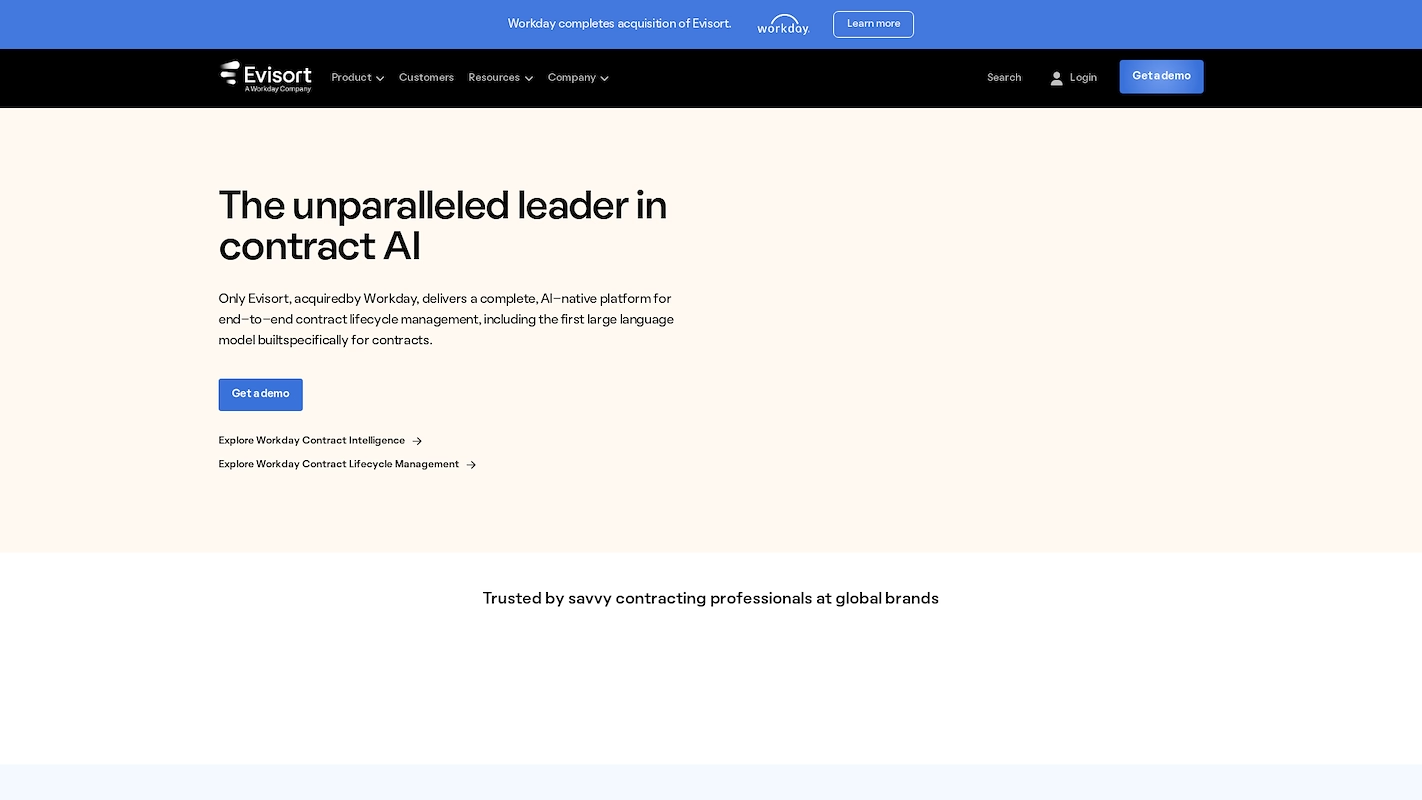
Evisort is a contract intelligence platform that uses AI to automate the contract lifecycle. The system helps teams manage agreements and extract data for business insights.
For proposal needs, it offers tools to track document status and organize contract information. This gives visibility into key terms and obligations across all agreements.
Evisort's Main Features
- Uses proprietary AI trained on over 11 million contracts to provide text analytics, NLP, and OCR functions.
- Extracts over 70 data points from contracts to connect information across the organization.
- Includes functions for both data import and data export to manage contract information.
- Provides tools to perform comparisons between different contracts.
How Evisort Compares to Juro
Average Review Score: 4.7/5 stars based on 90 G2 reviews.
- Evisort's AI is trained on over 11 million contracts, which provides more specialized text analytics compared to Juro's general AI assistance.
- It extracts over 70 specific data points from agreements, allowing for more detailed contract analysis than Juro's standard data functions.
- The platform includes a tool for direct contract comparisons, offering a more focused analysis of terms than Juro's general review process.
- Its AI uses NLP and OCR capabilities, which enables it to process a wider variety of document formats for data extraction compared to Juro's system.
Where Evisort Falls Short Compared to Juro
- Some users find that Evisort's platform can feel complex for new teams. In comparison, Juro is often described as having a more direct interface that simplifies initial adoption.
- The tool's customization options might feel limited for certain legal workflows. Juro, in contrast, offers a native editor that provides more granular control over document creation and editing.
- It may take longer to see a return on investment with Evisort. The platform has an average ROI of 17 months, while Juro's is typically around 11 months.
Pricing and Cost-Effectiveness
Juro offers a faster return on investment at 11 months versus Evisort's 17 months. Both platforms use quote-based pricing and have a similar two-month implementation time. For a custom quote, we recommend visiting Evisort's official website.
9) Icertis Contract Intelligence
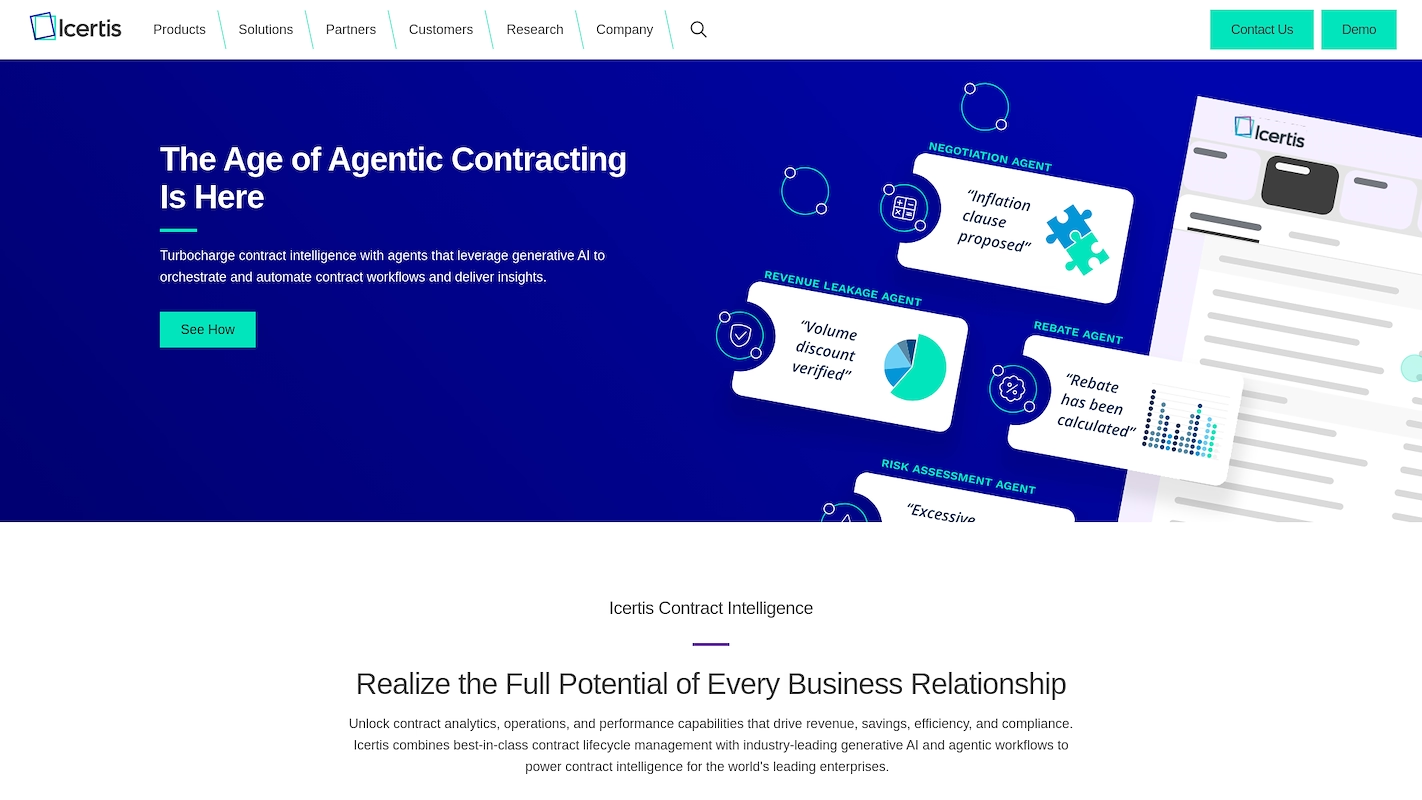
Icertis Contract Intelligence is a platform that uses contract data to connect information across an organization. The system manages the full agreement lifecycle and provides tools to assemble documents and track their status. This gives visibility into the entire workflow from creation to signature.
Icertis Contract Intelligence's Main Features
- Structures and connects contract information using an AI-powered platform.
- Provides tools to identify risks and manage compliance and performance.
- Includes workflow automation for contract authoring and compliance management.
- Secures data transfer between intranet and internet using SSL certificates.
How Icertis Compares to Juro
Average Review Score: 4.2/5 stars based on 81 G2 reviews.
- Icertis Contract Intelligence structures contracts as connected data, which offers deeper business insights compared to Juro's document-centric approach.
- It uses SSL certificates to secure data transfers, providing a specific security feature for data in transit that is different from Juro's standard security protocols.
- The platform includes specialized tools to identify risks and manage compliance, offering more proactive performance management than Juro's general compliance functions.
- Its AI-powered analytics provide seamless reporting straight from the platform, which gives more immediate business insights than Juro's general AI assistance.
Where Icertis Falls Short Compared to Juro
- Some users report that the platform's interface can feel dated and less intuitive, which is different from Juro's more modern and user-friendly design.
- Icertis Contract Intelligence has a longer implementation time of six months, unlike Juro's two-month average, which can delay when a team sees value.
- The tool sometimes requires the system to go offline to publish form changes. This can disrupt workflows, while Juro's platform generally allows for more seamless updates.
Pricing and Cost-Effectiveness
Juro offers a faster return on investment at 11 months compared to Icertis's 22 months, and a quicker implementation time of two months versus six. Both platforms use quote-based pricing. For specific details, we recommend visiting Icertis Contract Intelligence's official website.
10) ContractPodAi
ContractPodAi is a contract lifecycle management platform that uses AI to automate legal processes. The system helps in-house legal teams manage agreements from creation to renewal, providing a unified workspace for all contract-related activities.
ContractPodAi's Main Features
- Uses an AI-powered review function to analyze agreements against predefined legal playbooks.
- Offers a self-service contract desk for business users to generate standard agreements from templates.
- Includes a centralized repository with advanced search and reporting capabilities.
- Provides end-to-end workflow automation for approvals, signatures, and obligation tracking.
How ContractPodAi Compares to Juro
Average Review Score: 4.4/5 stars based on 138 G2 reviews.
- ContractPodAi's AI review function analyzes agreements against legal playbooks, offering more structured risk assessment than Juro's general AI features.
- Its self-service contract desk allows business users to generate agreements independently, which can reduce legal team workload more than Juro's standard template system.
- The platform provides one-click contract creation from various sources like Salesforce or email, a more integrated approach than Juro's manual creation process.
- It offers advanced third-party paper review, which gives more detailed analysis of external documents compared to Juro's native editing environment.
Where ContractPodAi Falls Short Compared to Juro
- Some users report that the platform's user interface can be less intuitive. This may result in a longer adoption period compared to Juro's more straightforward design.
- The initial setup and configuration can sometimes be complex. This might require more dedicated resources than Juro's generally quicker implementation process.
- While powerful, the AI features may occasionally require manual verification for accuracy, whereas Juro's system is often noted for its reliability in core functions.
Pricing and Cost-Effectiveness
Juro provides a faster return on investment at 11 months compared to ContractPodAi's 14 months. Implementation for ContractPodAi takes around 3.5 months, while Juro's is two months. Both platforms use a quote-based pricing model. For details, visit the ContractPodAi website.
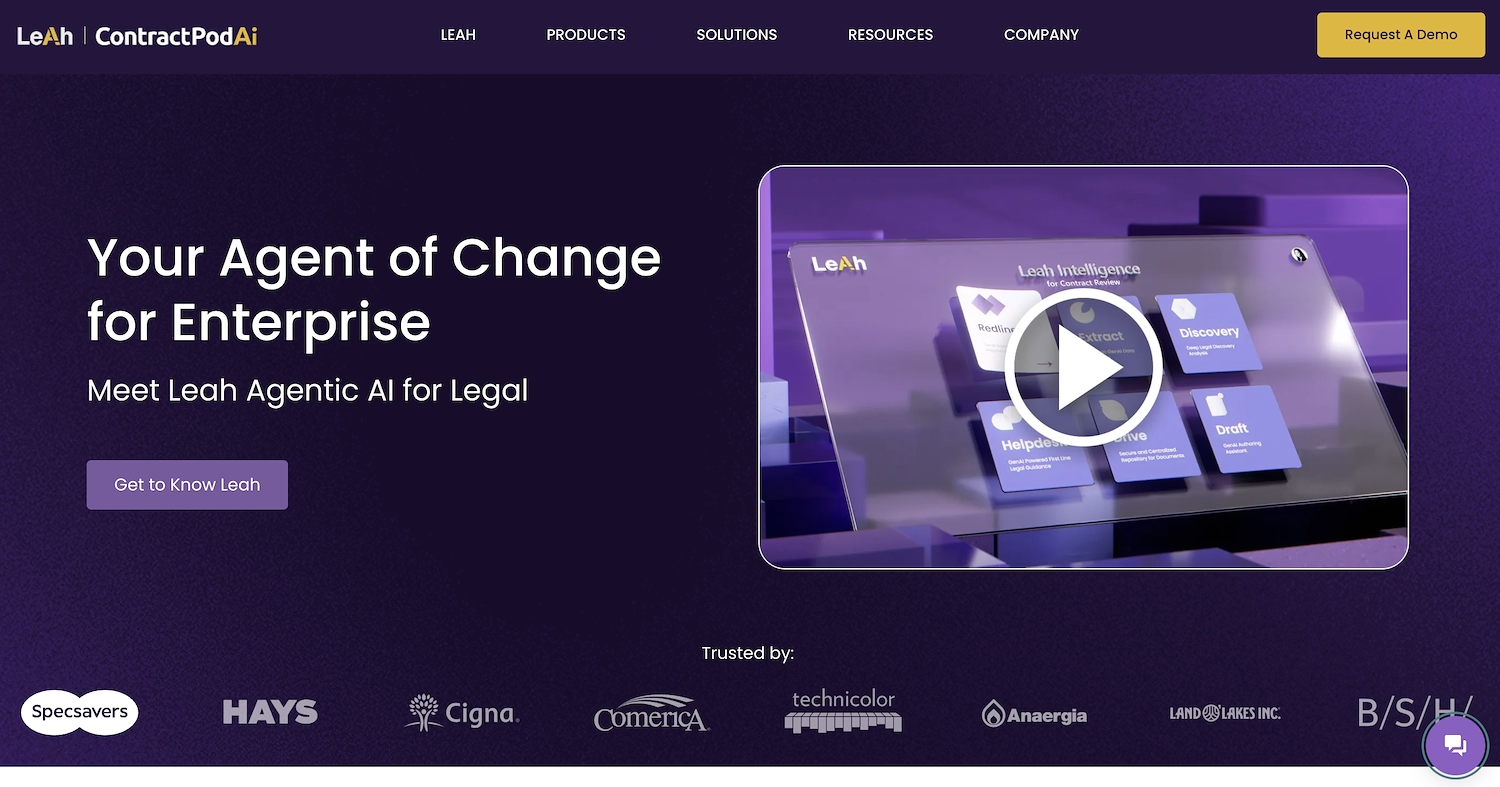
ContractPodAi is a contract lifecycle management platform that uses AI to automate legal processes. The system helps in-house legal teams manage agreements from creation to renewal. For document and proposal management, it provides a unified workspace to follow all contract activities.
ContractPodAi's Main Features
- Uses an agentic AI, Leah, that learns from an organization's legal patterns to provide business insights.
- Features a flexible workflow engine and guided processes for contract generation and management.
- Offers a smart repository with clause-level analysis and advanced search functions.
- Provides integrations with DocuSign, Salesforce, and Microsoft O365, along with single sign-on capability.
How ContractPodAi Compares to Juro
Average Review Score: 4.6/5 stars based on 45 G2 reviews.
- ContractPodAi uses an agentic AI, Leah, that learns from an organization's legal patterns to provide business insights. This offers a more adaptive analytical approach compared to Juro's general AI assistance.
- The platform includes a flexible workflow engine that allows for more customized automation. This is different from Juro's more standardized workflow system.
- Its smart repository provides clause-level analysis. This enables a more granular review of contract components than Juro's document-level management.
- The tool offers integrations with systems like Microsoft Outlook and Word. This allows users to work within familiar applications, which contrasts with Juro's platform-centric editing environment.
Where ContractPodAi Falls Short Compared to Juro
- Some users report that the platform's user interface can be less intuitive, which may result in a longer adoption period compared to Juro's more straightforward design.
- The initial setup and configuration can sometimes be complex, which might require more dedicated resources than Juro's generally quicker implementation process.
- While its AI is powerful, some reviews mention that its features may occasionally require manual verification for accuracy, whereas Juro's system is often noted for its reliability in core functions.
Pricing and Cost-Effectiveness
Juro provides a faster return on investment at 11 months compared to ContractPodAi's 19 months, and a quicker implementation time of two months versus five. Both platforms use a quote-based pricing model. For specific details, we recommend visiting ContractPodAi's official website.
Which One Should You Go With?
Choosing a Juro alternative depends on many variables, including your team’s specific needs and budget. This guide reviewed several options to help you evaluate which platform best fits your requirements and make an informed decision.
If your focus is on sales automation, 11x provides autonomous agents to manage tasks like prospect discovery and outreach. This approach can help your sales team focus on strategic objectives instead of routine GTM activities.




